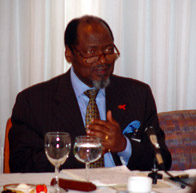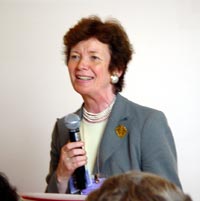News
Experts Say Bias and Violence Increase Women's Vulnerability to HIV/AIDS
- 23 September 2003
News
UNITED NATIONS, New York—Intensified efforts are needed to counter the violence and inequality that puts women at heightened risk of HIV infection, according to experts speaking in a panel discussion here on "Women: Meeting the Challenges of AIDS". Legislation and funding are important, speakers emphasized, but so too are actions to change attitudes that lead to violence against women and workplace discrimination against people with HIV/AIDS.

Co-hosted by UNFPA, the United Nations Population Fund, and UNIFEM, the United Nations Development Fund for Women, the roundtable meeting was held during a break in today's high-level meeting of the UN General Assembly to review progress towards achieving the goals of the Assembly's 2001 Declaration of Commitment on HIV/AIDS.
Addressing the Assembly earlier in the day, Secretary-General Kofi Annan said that despite some important advances, "we are not on track to begin reducing the scale and impact of the epidemic by 2005." Citing his follow-up report on the declaration, he noted that many countries still lack adequate policies for fighting HIV/AIDS—a third of all countries, for example, still have no policies to ensure that women have access to prevention and care, even though women are now half of those infected worldwide—and global spending is just half the $10 billion needed each year. (See UN press release.)
President Joaquim Alberto Chissano of Mozambigue, current Chairman of the African Union, chaired the roundtable session. In opening remarks, he noted that there are over 19 million women living with HIV/AIDS. Economic, legal and social inequities, limited educational opportunities, and cultural norms that put women at a lower status increase their vulnerability to HIV infection, he said.
"We as leaders have a responsibility to effect change," he stressed. "As members of government, we can lay the foundation to stop violence against women, end stigma and discrimination, ensure gender equality and improve livelihood opportunities."
Geeta Rao Gupta, president of the International Center for Research on Women, was the panel's moderator. She said the 2001 targets could not be met without addressing the inequality that makes women vulnerable to infection.
Kàtia Guimarães, a Brazilian researcher, spoke on the link between AIDS and violence against women, which she called "one of the most serious public health problems in the world". She recounted Brazil's experience in developing educational programmes to counter gender-based violence and described efforts by nongovernmental groups that work with men and provide shelter to abused women.

Elizabeth Mndzebele, a rural health promoter in Swaziland, talked about the difficulties women face as caregivers for family members living with HIV/AIDS, often in the context of extreme poverty, food insecurity and a severe shortage of painkillers, rubber gloves and other supplies. She called for increased support for families, and action to change social conventions that prevent men from providing care.
Akhila Sivadas, a social scientist and activist from India, spoke about workplace bias against people living with HIV/AIDS. "HIV-positive women must battle not only the virus, but also the most violent forms of stigma and discrimination," she said. India has made some progress in addressing this issue, but not in the informal sector.
A number of participants spoke from the floor. UNFPA Executive Director Thoraya Obaid stressed that women and HIV/AIDS is a human rights issue. Action to address it should be integrated with reproductive health measures, she said.
UNIFEM Executive Director Noleen Heyser spoke of the need to expand antiretroviral drug treatment and to remove restrictions on women owning land. "The only way of testing our commitment is to follow the money," she declared.
Mary Robinson, former Prime Minister of Ireland and former UN High Commissioner for Human Rights, said that tackling HIV/AIDS was not yet a priority issue for the women's movement. "We must make it one," she said.
--William A. Ryan